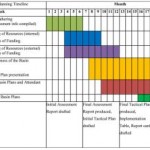Project Implementation Schedule: The Key Components
 A well-designed project implementation schedule clarifies and describes what the project should deliver and within what time-frames. In this article you will read on how to create a time-related framework that helps project planners to deal with the “on time” part of the project objectives and what needs to be outlined to produce deliverables and achieve goals on schedule, within budget and according to expectations.
A well-designed project implementation schedule clarifies and describes what the project should deliver and within what time-frames. In this article you will read on how to create a time-related framework that helps project planners to deal with the “on time” part of the project objectives and what needs to be outlined to produce deliverables and achieve goals on schedule, within budget and according to expectations.
The project implementation schedule is an important time management document that defines and schedules the major phases of project work being carried out to fulfill the desired project objective(s) and achieve the expected deliverables. This document describes project initiatives as a logical sequence of events over time to progress the project from its original concept to the final implementation. Usually, the document is used against progress of the project to monitor and assess ongoing activities and to create status reports.
The development of the project implementation schedule refers to the following two statements:
- The schedule creates a framework for the whole project implementation plan and facilitates creation of the work breakdown structure (WBS) by placing the related activities, tasks and responsibilities on timeline.
- The schedule outlines the project phases and their overlaps and shows them on the common project’s timeline.
In the project implementation schedule, the following information (the key components) should be provided in a clear and easy-to-read format:
- Number and brief descriptions of project phases. A project phase is a manageable portion of work that is accurately defined and measured by a deliverable and time-frame. Usually the project phase is divided into logically dependent activities to compete a certain job. Each project phase should be briefly described during the Project Setup process to provide an overview of the jobs being initiated and completed during that phase.
- The deliverables set being archived within each project phase. Completion of each project phase results in achieving or producing deliverables. The implementation schedule should specify a specific set of deliverables being achieved after successful completion of every project phase.
- Major activities for each deliverable. During implementation of each project phase, the major activities should be outlined in order to achieve each deliverable, within the defined time-frame of that phase.
- Key milestones. The way to audit and control implementation of each project phase is to define check-points (the key milestones) to be conducted on a regular basis during the implementation process.
- Responsibilities and assignments. Completion of each project phase requires allocation of responsibilities. The project manager should set employee responsibilities and assignments per project phase and also define who is responsible for and assigned to the delivery of the major activities within each project phase.
- Dependencies. A dependency is a measure of interaction between two or more project phases that identifies how one project phase exerts influence on other phases. Dependencies define an overlap between several project phases and identify what deliverables result in successful completion of two or more phases.
When all the components of the schedule for project implementation are defined and the schedule is developed and designed, you need to make sure that this document has been checked and approved by stakeholders (the sponsor) and the project manager in order to ensure that its content is appropriate and its targets are clearly stated and achievable.














